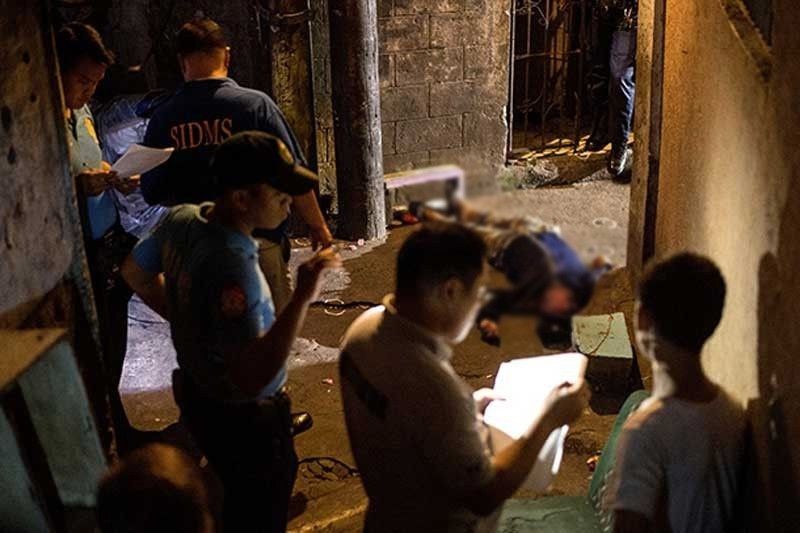Abuse in 'drug war' routinely covered up, advocates say

MANILA, Philippines — The killings in the Duterte administration's bloody "war on drugs" are part of a "war" one that "terrorizes" the poorest of the poor and leaves them with no recourse for justice, a panel of rights advocates and lawyers said.
In a second report that will be sent to the 47th Session of the United Nations Human Rights Council, Investigate PH highlighted what it said was the lack of domestic remedies available to victims of the "war on drugs", many of whom belong to the country's poorest.
"By simply yet selectively treating illegal drug use as a crime rather than a larger public health challenge, the president has launched a war against the poor, that serves to demonstrate his power and to sow fear," the report read.
"'Tokhang' is a shortened phrase for 'knock and persuade,' referring to the police house-to-house visits. But in reality, it is 'kick in the door and shoot'...Those killed in anti-drug operations are overwhelmingly poor people unable to assert their rights to due process."
Citing interviews with victims and witnesses, Investigate PH said poor communities are affected by these operations through:
- the shock of losing a child or a family breadwinner
- the resulting financial hardship
- extortion from funeral parlors allegedly connected to the police
- continuous police pressure to desist from filing a complaint with authorities
According to witnesses, relatives of victims are still visited by cops years after their family members are killed in operations. They are asked if they still intend to file a case.
"Instinctively the people say 'no,' hoping that the police will leave them alone. They fear for the lives of their other children," Investigate PH said.
'Nanlaban' narrative assailed
The investigative group also called into question the police claim that most if not all of the killings resulted from legitimate drug suspects violently resisting arrest.
"Evidence indicates that unarmed victims have been executed either in their home, on the street or after being abducted, with weapons or drugs likely planted after," the report read, citing photographic evidence of victims who were handcuffed and unarmed when they were shot by cops.
"In one case, a witness saw the police execute three men, then plant guns on them after firing the weapons in the direction the police had come from."
Despite the 'nanlaban' narrative, Justice Secretary Menardo Guevarra said that his department's review of drug cases found lapses in protocol. He said that there many cases where "no request[s] for ballistic examination or paraffin test [were] pursued" in cases where cops claimed suspects violently resisted arrest.
Independent autopsies on drug war victims also found that there was "no genuine police inquiry into the cause of death" on the part of the authorities. Death certificates and police examinations were found lacking as they did not record X-rays of victims or evidence of defensive wounds.
Investigate PH pointed out that the finding has so far "not translated into changes in anti-drug policy and operations or placed accountability for the killings."
Lack of redress
The group also pointed to what it said was the persistent lack of redress for abuses by State agents, saying: "Police routinely cover-up the circumstances of killings in anti-drug operations, intimidate families and potential witnesses, and obstruct review of most killings by the Department of Justice."
Investigate PH also said that, on an institutional level, the approach to barring justice is two-pronged: on the ground, the friends and families of victims are intimidated and even threatened. Meanwhile, police leadership points to the lack of formal complaints as evidence that operations are done by the book.
Out of over 6,000 anti-drug killings acknowledged by official police data, the Philippine National Police has given the justice department records of 53 cases that its Internal Affairs Service has worked on.
"The Duterte government has ensured the lack of accountability for police failing to follow standard protocols in thousands of cases of anti-drug operation killings. The Ombudsman has accepted all these killings as part of 'regularity' in police operations. The higher courts have also rejected claims by victims’ relatives, in favor of the police," Investigate PH said.
To recall, Investigate PH in its first report said that numerous and documented cases of abuse perpetrated by state forces have "become more institutionalized, orchestrated and entrenched" under the Duterte administration.
READ: Duterte government has no interest in probing themselves — global group
Illegal drugs cheaper than ever
Commissioners of the panel also criticized the Duterte administration's flagship anti-narcotics campaign for "failing to quell the trade in illegal drugs — its purported goal — which continues to flow cheaper than ever."
In 2020, crystal methamphetamines or shabu was found to still be behind the most arrest and treatment admissions in the Philippines, the United Nations Office on Drugs and Crime reported.
Citing figures from the Philippine Drug Enforcement Agency and the Dangerous Drugs Board, the UNODC said that shabu "remains the main drug of concern in the Philippines" with just a year left under the Duterte administration.
According to the government's Real Numbers PH info campaign, 13,400 barangays are yet to be classified as "drug-free" out of 42,045.
The president's landslide win in 2016 was founded on, among other things, ambitious promises of ending drugs and criminality within the first six months of his term. He later asked for a six-month extension that he also later failed to meet.
READ: With a year left in Duterte's term, UNODC says shabu still a major problem in the Philippines
- Latest
- Trending


































